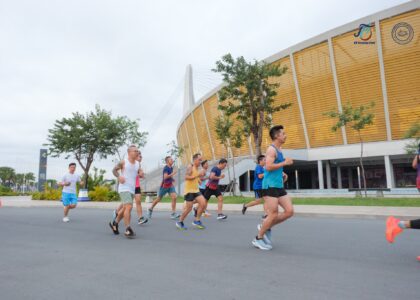Proper nutrition is essential for runners as it plays a crucial role in fueling workouts, supporting recovery, and enhancing overall performance. Here are key aspects of nutrition for runners:
1. Hydration:
Before Running: Drink water throughout the day and consume about 16-20 ounces (500-600 ml) of water 2-3 hours before running.
During Running: Consume 7-10 ounces (200-300 ml) of water every 10-20 minutes during the run.
After Running: Rehydrate with water or a sports drink to replenish electrolytes lost through sweat.
2. Carbohydrates:
Before Running: Consume a carbohydrate-rich meal 2-3 hours before a run. This could include oatmeal, whole grain toast, or a banana.
During Running (for longer distances): Consume easily digestible carbohydrates such as energy gels, chews, or sports drinks to maintain energy levels.
After Running: Refuel with a combination of carbohydrates and protein within 30-60 minutes to replenish glycogen stores. Options include a banana with peanut butter or a recovery shake.
3. Protein:
Before Running: Include protein in pre-run meals to support muscle function. Options include yogurt, eggs, or a protein smoothie.
After Running: Consume a protein-rich meal or snack to aid muscle recovery. Good sources include lean meats, beans, dairy, or plant-based protein sources.
4. Fats:
Include Healthy Fats: Incorporate sources of healthy fats, such as avocados, nuts, seeds, and olive oil, into your overall diet to support overall health and energy.
5. Vitamins and Minerals:
Eat a Variety of Fruits and Vegetables: Ensure a diverse intake of fruits and vegetables to obtain a range of vitamins and minerals important for immune function and overall health.
6. Meal Timing:
Pre-Run: Allow 2-3 hours for digestion before consuming a larger meal. For a smaller snack, eat 30-60 minutes before running.
Post-Run: Aim to eat a balanced meal or snack containing carbohydrates and protein within 30-60 minutes after running to aid recovery.
7. Individualized Nutrition:
Experiment with Timing: Some runners may prefer to eat more before a run, while others may feel better with less in their stomach.
Consider Dietary Restrictions: If you have dietary restrictions, plan meals and snacks that align with your specific needs.
8. Listen to Your Body:
Pay Attention to Hunger and Fullness: Listen to your body’s signals of hunger and fullness to adjust portion sizes accordingly.
9. Supplements:
Consult a Professional: Before considering supplements, consult with a healthcare professional or a registered dietitian to ensure they are appropriate for your needs.
10. Recovery and Rest:
Prioritize Sleep: Ensure you get adequate sleep for proper recovery and performance.
Remember that individual nutritional needs vary, and it’s essential to find what works best for you through experimentation. Consulting with a registered dietitian or nutritionist can provide personalized guidance based on your specific training goals and dietary preferences.




